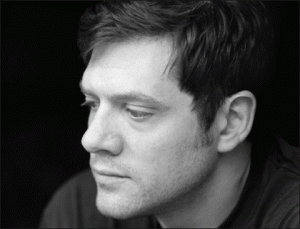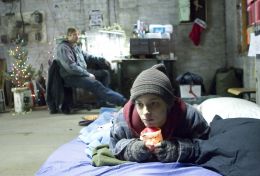“All the same, I keep thinking of music: character as melody and countermelody, the melody of the voices on the lawn, the sound of the frantic trumpet tangled around the slow and placid violins in Charles Ives’s The Unanswered Question, what Ives referred to as ‘Shadow counterpoint. That’s the shadow the main theme gives off.’”
– Charles Baxter, Burning Down the House: Essays on Fiction
I. Where Words Start, So Does Sound
Ask yourself: where is the heart in which we feel certain music?
Where do you get tapped when the train-ride clicking ease of Willie Nelson’s “On The Road Again” begins? What part of your hips or ass twitches first to the sampled, funky, addictive swamp rhythm of Missy Elliott’s “Get Ur Freak On?” Have you heard the last minute of “For Martha” by Smashing Pumpkins? The creeping, moody guitar crescendo with narrowed feedback sounds like a child inside an adult’s body, slowly crying higher and higher while fighting it (when I found out that song was about Billy Corgan’s mother, I think I called home every day for a month straight, just to hear my mom’s voice.)
By heart. What en expression. What do you see when you say the words, “I know that song by heart.” When we say those words, we speak far beyond the actual song, refracting into the cavernous dwellings, where natural emotions reside. Deep down, there is a response cloaked under the jagged arteries interlocking progression; the soft, tender, thumping palpitations our heart renders when we find sound, whether it be new or different or familiar. I catch myself liking new music I wouldn’t normally enjoy on various occasions, and I believe it’s a physical response to a malaise, or distractions, or a different spell cast upon me.
Another interesting form of this communication is the exciting world of theater. Theater has managed to extract the raw form of live emotion, visceral activity and contained tension. Even silence reverberates, enhancing a mood or setting before someone speaks or, intensely, between moments of dialogue. This occurs within a certain closed space where sound bounces and travels everywhere. In theater, feet can be just as much a character as another character; a biker or cowboy boot stomping or kicking its way across the stage; a businesswoman or a woman who means business with three-inch heels that crave respect; the finger snap; a whistle; the hand clap accompanying a good ‘ole improv foot-tapping.
As does language. Where words start, so does sound. Arguably, centrality is transcendent when music is applied for dramatic tone. Worlds are moved, beliefs divided and imaginations shifted. Being in a quiet, sound-protected space, we are allowed to hear music from voices. Could there be a more organic stage at which music and the heart feed off each other?
I was lucky enough to sit down with Adam Rapp–prolific writer, musician, director, and novelist–and attempt a better understanding of the process in which the words we create are shaped by music.
Rapp began his literary career as a novelist, publishing six Young Adult novels in his twenties and early thirties, along with The Year Of Endless Sorrows, a novel for grownups released in 2007, Rapp has written and directed two feature films and countless stage plays. We first chatted before a performance of Los Angeles, a terrific play Rapp was directing, and time passed before we had a chance to catch up over other projects, such as Less the Band, the group Rapp plays in with steadfast theater friends, and Blackbird, a new film Rapp adapted from his off-Broadway play of the same name and directed (out this fall in New York and Chicago), and Punkzilla, Mr. Rapp’s new Young Adult novel, published on May 12, 2009, by Candlewick Press.
II. Interview
BRIAN BARTELS: Adam, explain how the organic evolution of music affects theater, and vice versa, and how they will always shift dynamics.
ADAM RAPP: When I started writing, I was a novelist. When I discovered theater – actually, more precisely – what I discovered while writing music was an immediate jolt that accompanied the process, something that takes a novel three-hundred pages to accomplish, whereas music opened up the floodgates. When theater arrived, it was a new attempt to figure out what that form truly is. You can delay an emotion in such a crystallized emotional container and also have a lyric – which tells a story or abstract a feeling. I was drawn to that and how the potential of storytelling can be living in the same organism. You know, it’s weird we’re talking about this, because earlier today, I got an offer from The Kitchen, which is an experimental theater group, to perform the “orchestra pit.” There’s going to be a play set in an orchestra pit. Not to spoil it, but I see a conflated, classical musical set-up, with some . . . weird-ass something, performed within a hierarchical display in which dancers and performers are above the band, and maybe somebody will fall into the pit, and someone will eat them. We have been talking about this project for months, almost informally, about how to approach it, and that, to me, is one of the most exciting parts about theater: if you’re there to function, and find characters really needing from each other, what I’ve experienced more and more is just how music can elevate that out of the apparent natural form. [Contributor’s note: The piece that Rapp is referring to found its way into the Kitchen space in December 2008, titled Astroland.]
Finer Noble Gases, an early play of yours, had a band written into the play, right?
Right. A lot of my earlier stuff had songs, and I didn’t even know why. I wasn’t really playing music, but I was drawn to this moment where someone needs to sing something. I always had this instinct to write songs and just didn’t know how to do it. Though I am drawn to specific musical genres – indie rock and classic rock, mostly – I’ve been engaged by the soul-heavy troubadours, the Nick Drakes, the Bill Callahans, and usually do what novelists do, which is write as though I’m recording a song in my bedroom, you know. Tom Waits is such a great storyteller and a major influence.
Do those musical influences affect the physical space in your writing?
I find everything I write wants to have its own planetary world. With Los Angeles, when I read the play with Julian, the writer, I was thinking about how we could counterpoint a completely relentless downward spiral with music – and not just to give the audience a break, but to give the play sonic points; a different set of bandwidth, a different sound.
Was that a collaboration? How much were you involved?
I stayed out of it. I knew if I got too involved I would be controlling. (Laughs.) But we put the writer and musicians in a room together, and they created something so integral to the finished product.
What brought up the jazz motif in Los Angeles?
I hate Los Angeles. I was drawn to these old dive bars and old lost lounges. I would see these people as if they were washed ashore. They had these little gigs at some old hotel bar, and my response was always, “Where did they come from?” That was the concept of the lounge band. The design was a mirror of, say, a Howard Johnson’s, and everyone thinks it’s palm trees and Rodeo Drive, but I think it’s actually International House of Pancakes. To me, that was the interesting part. We take classic diners and we try to make them gleam.
Blackbird, your new film, was adapted from your original play. How was the music transformation, from which you had limited space and a very specific music direction for the play (ringing telephones and pop music accompanying a dark and moody dramatic setting), translated into the film score?
For the play, I had songs very specifically chosen, and I would write for the music, and the scene, and I felt those songs (i.e., Low’s “Bright Place” and Cat Power songs) held up. If I had my druthers, I would’ve included these great songs in the film, but with film, you have to pay the artists so much, so what I did was use Dawn Landes, who is similar to Cat Power, yet slightly more quirky, with that similar longing, sadness and loneliness. Given our limited film budget, I had musicians kind enough to unselfishly contribute to the score. Dawn was great, and Bill Callahan (a.k.a. Smog) wrote a song for us, and he was great. I remember the day I discovered him. I was reading a review in the Village Voice, and he was slated to perform that night at the Mercury Lounge. Not knowing anything about him, I checked out the show with a girl I was dating at that time. That afternoon, I picked up his record and proceeded to spend the entire afternoon walking around the East Village with my headphones on, listening to Smog. It was so bleak and beautiful and minimal. I couldn’t get it out of my head. Later on, we got to the show, listened to this gifted performer who hardly looked up from nervousness and wore a flight jacket because he was so cold, and then we left the show. I was in awe, and my girlfriend, who grew up in a commune, and subsequently turned to a more structured, corporate life as an adult, walked out of that show, and she was like, “That was bullshit.” And I walked out of there thinking, “That was the greatest thing I’d ever seen.” And then we broke up.
In Essential Self-Defense, a play from 2007, karaoke is involved; it was billed as a “rock and roll play,” with punk rock librarians and live music.
It was a lighter play, but it was as dark as anything I’d written. The play was about terror. It was about waking up in the morning with multiple fears and finding out how to solve that. But it was also about these people from a small town, who came to a venue needing to spew lyrics. They needed a forum where they could will something out of the world that wasn’t prescribed. It was a freedom of speech movement inspired by a librarian; all those people locked in their lives who needed a place to go to and change their own shape.
What songs/music/moments in a song make you feel a certain connection? If “Music hits the heart,” where is your inspiration inside that?
Bill Callahan’s Red Apple Falls is a direct hit. Its language and tone are so affecting. Some lyrics are “Most of my fantasies are making someone else come/most of my fantasies are of to be of use/to be of some hard/simple/undeniable use.” The melancholic dirge of what he’s expressing is an elliptical, raw meaning. He’s singing about uselessness and the lack of potential, a deeply felt dichotomy of sound and sentiment.
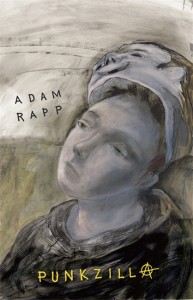 How did Punkzilla arrive to you? The story’s letters represent the intangible fragments of our handwritten legacies. I found myself missing the personalized sentiment from handwritten letters, and I think the book successfully conveys the lost fragments of our lives through these voices that stick and tell their story. Describe your approach/inspiration to that format.
How did Punkzilla arrive to you? The story’s letters represent the intangible fragments of our handwritten legacies. I found myself missing the personalized sentiment from handwritten letters, and I think the book successfully conveys the lost fragments of our lives through these voices that stick and tell their story. Describe your approach/inspiration to that format.
I always wanted to write an epistolary novel and one about brothers. Part of the novel was borne out of a wish that I was never able to complete for myself when I was fourteen, which was to run away from my military school. I didn’t have the courage and the kid in the book does, so it was fun for me to live through that years later. I like the idea of the novel being a found object. It’s essentially his spiral notebook filled with not only letters to and from his older brother, but lots of other written paraphernalia: a note from the commandant’s office; a letter from a girl; a going away card from a friend in Portland; a letter to his mother that he couldn’t allow himself to send; things of that nature. The novel itself is actually an artifact of this kid’s life.
Approaching YA characters, you don’t write with restraint, and I feel the characters are justified by your honesty with them. How much do you let your conscience abide in these settings?
When I write “YA” stuff I don’t consider the age of the audience at all. I find that “writing down” to kids is condescending. They deserve the toughest, purist truths and it’s my job as a storyteller to provide that for them. The things kids see on the street don’t get dumbed down for them, so why should books do that? I never even consider the YA genre when I’m writing. I try and keep that completely out of my mind.
What I will add is that most of the YA market is controlled and gate-kept by middle-aged teachers and librarians, many of whom are very progressive, but many of whom are severely out of touch with what it’s like to be a teenager. And sometimes as a writer for the genre you feel like you’re writing for them, not the teenagers. I do my best to wipe them out of my consciousness and focus purely on the protagonist and what he or she wants and what his or her journey is. I’m at my best when the notion of “genre” is far, far away.
What’s interesting is how far you traverse to achieve Punkzilla’s adult-like experiences in a 14-year-old’s body. Punkzilla’s youth is evident in his grammar, how he relays his stories, and his drug-taking, sexual encounters and aptitude for meeting and connecting with total strangers. Most of all, he wants to avoid the blanket of conformity that military school posits. Was your time in military school a helpful guide for his character’s trajectory?
I wanted Punkzilla to articulate dissatisfaction with his culture, with his family, with himself and his own physical limitations. So much of being a teenager is bottling all of these frustrations and we’re so often told what not to do. In some ways I think Punkzilla feels out of time. Being drawn to punk music, which pre-dates him by thirty-plus years was a good thing to get in his blood. And the military school stuff and being from a military family helped give him something to bang his head up against. At his core he is a tenacious non-conformist, which is what I love about him.
I’ve always liked how Charles Mee said our culture writes us before we begin a story. The bands in Punkzilla reflect bands in their rebellious, angst-ridden and non-conformist legacies (the Dead Kennedys, the Clash, Deerhoof, Wolf Parade, the Liars, etc.). Did that music wield a direct connection to Punkzilla’s maintained non-conformity?
I think he probably likes Liars the most. He will probably listen to Drum’s Not Dead more than I do.
Music influences many things, such as writing, but how much does it influence your process? Where is that line channeled in your process, given your steadfast devotion/inspiration with music?
I listen to a lot of music, mostly when I’m walking around the city or on a subway or at an airport. And whether it’s Neutral Milk Hotel or Pink Floyd or Bill Withers it can help to put me in a meditative state of mind, to time travel. Once I start writing, though, it has to be quiet or I get distracted from the line of thought I’m working through.
What is your relationship with your editor? Are you given certain carte blanche with the final draft?
My editor at Candlewick is tough and honest and often tells me I’ve written too much. A large part of the process for me is egregiously overwriting and then finding where the gold is, if there is any to find. My editor helps me to boil things down. I’ve cut fifty pages from a novel based on one editorial letter from her. When we get past that part, then things go pretty smoothly. I have a lot of trust in her. Ultimately I write what I want to write and end things the way I want to end them, but she is a smart woman and I usually take most of her advice.
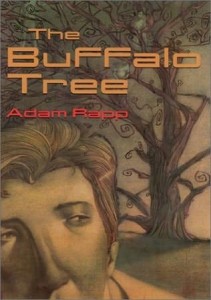 You had an interesting reflection re: YA publishing in your play The Metal Children, inspired by your book The Buffalo Tree being banned in Pennsylvania. In the play, the main character stresses how limited success can be inside the YA world, how an author usually receives a small number of copies and almost never makes a profit. So here’s the economy question: How much strife surrounds the YA market now, given the limited prints and, unfortunately, limited exposure based on budget?
You had an interesting reflection re: YA publishing in your play The Metal Children, inspired by your book The Buffalo Tree being banned in Pennsylvania. In the play, the main character stresses how limited success can be inside the YA world, how an author usually receives a small number of copies and almost never makes a profit. So here’s the economy question: How much strife surrounds the YA market now, given the limited prints and, unfortunately, limited exposure based on budget?
With the current economic climate, I’m sure print runs are down and lists are getting cut. It happened in the early nineties when cookbooks and cop novels were taking the place of many of the midlist literary titles. The good thing about the YA market is that it’s largely a library market and when libraries make buys they don’t return books. In order for libraries to buy your book, though, you have to get their attention with good reviews. They like to see those little stars next to reviews. Fortunately, so far I’ve been lucky with Punkzilla, so hopefully it will have a nice strong life.
In your own words, define music.
Music is the language of yearning that comes out of an animal cry into thought process. It is joy and love and animal tones; animal language.
This is a broad question, but do you feel there is a connection between Music and America right now?
I’m not sure where to look anymore. I don’t listen to mainstream radio and I find myself buying less new music than I used to. I still go to Other Music (in New York) – I think they do a great job seeking out new bands and bridging the gap for the consumer. And labels seem to be shrinking by the day. So how do we find the bands that are reflecting what’s really going on out there? I guess through magazines and the Internet. Or just showing up at Mercury Lounge and places like that. I’m drawn to bands that are actually trying to say something beyond how their girlfriend fell into a swimming pool with all her clothes on or how they can’t get laid or want to have sex with someone’s mom.
III. Wind
My first thought after registering these discussions: wind. As dull as it may sometimes be, wind moves with sound, along with strings, keys, and, yes, skin. It’s no surprise that our bodies create music – and I speak beyond the landscape of lungs; I’m talking about our flesh and bones creating music. One recent morning, I couldn’t sleep. Lying in bed, I was creating music. 6:26 A.M. My head rested on a pillow, covered by a pillowcase, and through the layers of fabric and three-hundred thread-count, through the layered pillowcases, pillow, and bed sheets, my ears caught my movement, up from the hollow dimensions of my firm mattress. I tapped my fingers to a rhythm six inches from my head, and my ears heard a distant (muffled) bass drum sound. I immediately conjured half a dozen Foo Fighters songs that start with that same drumbeat. I haven’t listened to the Foo Fighters in a while, but the familiarity was so prominent I rattled off those songs like I knew them by heart.
Recently, a friend linked me to a performance of “Nervous Breakdown” by Black Flag on YouTube. (Check it out if you can’t make your psychiatrist appointment this week.) Lead singer Henry Rollins, circa early 1980s, reads from a Henry Miller journal before the song starts, this self-affirmation detailing who the writer was as a singular human, a sole entity, his response to the earth, to what he couldn’t control, to the silent applause and intangible stratosphere.
While watching this performance, I melted with brazen understanding. “I’m crazy and I hurt,” Rollins sang. And I saw the disenfranchisement his character screamed, a direct connection swallowed in space, and though it was internal, it felt, as I watched and listened, as a reflection of myself and my own physical defeats and false starts. It’s when he sang, “Head on my shoulders,” that I received full affirmation. I’m crazy. I’m hurt. Emotions. Head. Shoulders. Physical matter; as though the weight of the universe watched my physical expanse and its organic reactions collide. And then we – the universe and I – just laughed about it.
These motifs are – like any great string of notes or frequencies or vibrations – reflections of space and time to me, somehow never contained. Like language, words and the characters that attempt to translate the sentiment, they are somehow meant to communicate to us, and occasionally, we are lucky enough to find interpretation in the moments where effort connects. Music is heart. It is the blood that reaches our strained continuity. As long as those expressions reach such valves, how can we help but listen.
Further Resources
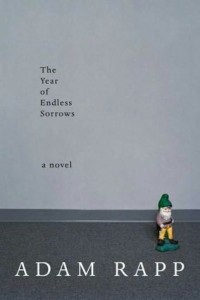
– Read a sample chapter from Punkzilla. To possibly win a free copy of the book, comment on the Shooting Stars Magazine blog by June 15.
– Here’s an excerpt from Rapp’s The Year of Endless Sorrows (FSG, 2007).
– The author’s play Red Light Winter is a recent Drama Book Shop pick; stop by this wonderful store (250 W. 40th St., NY, NY) for a copy, or order one online.
– More recent interviews with Rapp: in Time Out NY (2008) and on Broadwayworld.com (2007). Links to Rapp-related articles and reviews in the NY Times.

